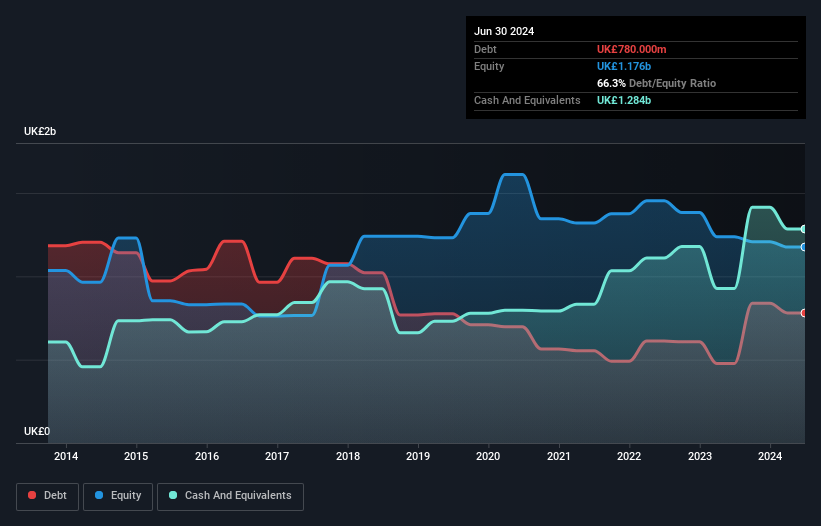- United Kingdom
- /
- Construction
- /
- LSE:BBY
These 4 Measures Indicate That Balfour Beatty (LON:BBY) Is Using Debt Reasonably Well

The external fund manager backed by Berkshire Hathaway's Charlie Munger, Li Lu, makes no bones about it when he says 'The biggest investment risk is not the volatility of prices, but whether you will suffer a permanent loss of capital.' It's only natural to consider a company's balance sheet when you examine how risky it is, since debt is often involved when a business collapses. We can see that Balfour Beatty plc (LON:BBY) does use debt in its business. But the real question is whether this debt is making the company risky.
When Is Debt Dangerous?
Debt is a tool to help businesses grow, but if a business is incapable of paying off its lenders, then it exists at their mercy. If things get really bad, the lenders can take control of the business. However, a more common (but still painful) scenario is that it has to raise new equity capital at a low price, thus permanently diluting shareholders. Of course, the upside of debt is that it often represents cheap capital, especially when it replaces dilution in a company with the ability to reinvest at high rates of return. The first step when considering a company's debt levels is to consider its cash and debt together.
View our latest analysis for Balfour Beatty
What Is Balfour Beatty's Net Debt?
You can click the graphic below for the historical numbers, but it shows that as of June 2024 Balfour Beatty had UK£780.0m of debt, an increase on UK£477.0m, over one year. However, it does have UK£1.28b in cash offsetting this, leading to net cash of UK£504.0m.

How Healthy Is Balfour Beatty's Balance Sheet?
According to the last reported balance sheet, Balfour Beatty had liabilities of UK£2.87b due within 12 months, and liabilities of UK£1.34b due beyond 12 months. Offsetting this, it had UK£1.28b in cash and UK£1.31b in receivables that were due within 12 months. So its liabilities outweigh the sum of its cash and (near-term) receivables by UK£1.61b.
This is a mountain of leverage relative to its market capitalization of UK£2.23b. Should its lenders demand that it shore up the balance sheet, shareholders would likely face severe dilution. Despite its noteworthy liabilities, Balfour Beatty boasts net cash, so it's fair to say it does not have a heavy debt load!
The modesty of its debt load may become crucial for Balfour Beatty if management cannot prevent a repeat of the 20% cut to EBIT over the last year. Falling earnings (if the trend continues) could eventually make even modest debt quite risky. The balance sheet is clearly the area to focus on when you are analysing debt. But ultimately the future profitability of the business will decide if Balfour Beatty can strengthen its balance sheet over time. So if you want to see what the professionals think, you might find this free report on analyst profit forecasts to be interesting.
Finally, a company can only pay off debt with cold hard cash, not accounting profits. Balfour Beatty may have net cash on the balance sheet, but it is still interesting to look at how well the business converts its earnings before interest and tax (EBIT) to free cash flow, because that will influence both its need for, and its capacity to manage debt. Over the last three years, Balfour Beatty actually produced more free cash flow than EBIT. That sort of strong cash generation warms our hearts like a puppy in a bumblebee suit.
Summing Up
While Balfour Beatty does have more liabilities than liquid assets, it also has net cash of UK£504.0m. The cherry on top was that in converted 149% of that EBIT to free cash flow, bringing in UK£169m. So we don't have any problem with Balfour Beatty's use of debt. There's no doubt that we learn most about debt from the balance sheet. However, not all investment risk resides within the balance sheet - far from it. To that end, you should be aware of the 2 warning signs we've spotted with Balfour Beatty .
If, after all that, you're more interested in a fast growing company with a rock-solid balance sheet, then check out our list of net cash growth stocks without delay.
Valuation is complex, but we're here to simplify it.
Discover if Balfour Beatty might be undervalued or overvalued with our detailed analysis, featuring fair value estimates, potential risks, dividends, insider trades, and its financial condition.
Access Free AnalysisHave feedback on this article? Concerned about the content? Get in touch with us directly. Alternatively, email editorial-team (at) simplywallst.com.
This article by Simply Wall St is general in nature. We provide commentary based on historical data and analyst forecasts only using an unbiased methodology and our articles are not intended to be financial advice. It does not constitute a recommendation to buy or sell any stock, and does not take account of your objectives, or your financial situation. We aim to bring you long-term focused analysis driven by fundamental data. Note that our analysis may not factor in the latest price-sensitive company announcements or qualitative material. Simply Wall St has no position in any stocks mentioned.
About LSE:BBY
Balfour Beatty
Balfour Beatty plc finances, designs, develops, builds, and maintains infrastructure in the United Kingdom, the United States, and internationally.
Undervalued with adequate balance sheet.
Similar Companies
Market Insights
Community Narratives




